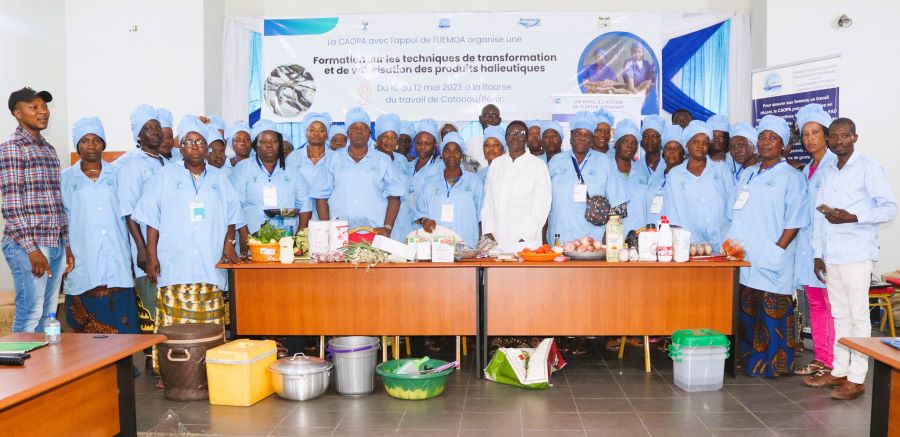Benin – Cotonou – African Confederation of Professional Organizations of Artisanal Fisheries (CAOPA), with the financial support of the West African Economic and Monetary Union (WAEMU), has organized a training workshop on the techniques of processing and value-adding to fishery products for women processors and fishmongers from Benin. The event took place from 10 to 12 May at the Bourse de Travail in Cotonou.
This support is part of the improvement of the structuring of the fisheries sector and the capacity building of technical and institutional skills of the actors in the WAEMU Member States. The general objective of this workshop was to strengthen the professional capacities of women fish product processors, focusing on the use of good hygiene practices (GHP), good manufacturing practices (GMP) and innovative techniques for processing and value-adding fish products.
The participants were trained in the use of and compliance with GHP and GMP in the processing and marketing of fishery products. They acquired the necessary skills to use innovative value-adding techniques in the processing and marketing of fishery products. The approach implemented aimed at controlling processes, safety parameters in the face of constantly changing regulations, as well as product conservation and shelf life. The aim was to introduce innovative products to create a new nutritional and economic appeal in the processing and value-adding of species, particularly those with low commercial value.
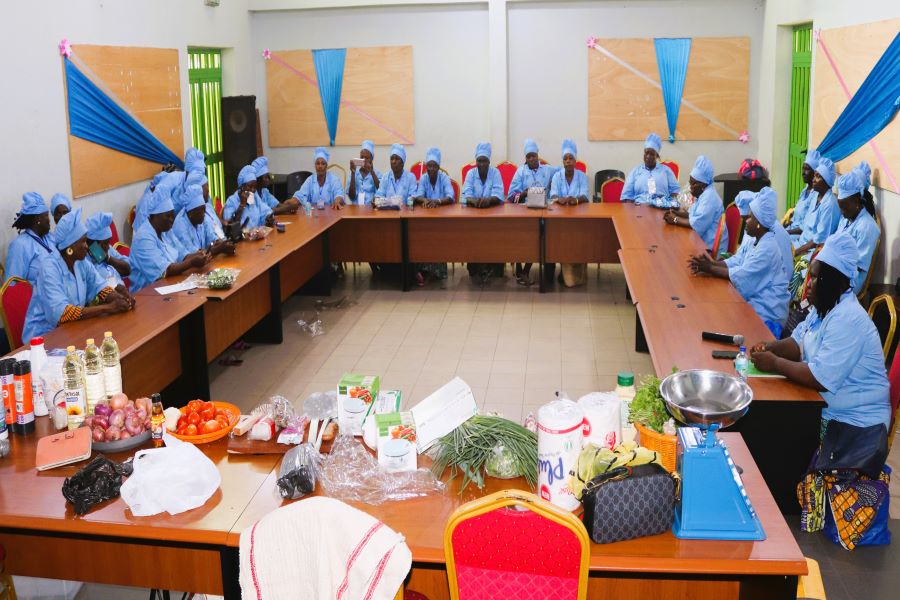
Women play an important role in the fisheries sector, but they often face barriers that limit their access to the economic benefits of the sector. The workshop also aimed to diversify their activities, increase their production, improve the quality of their products and strengthen their competitiveness on national, sub-regional and international markets.
The president of UNAPEMAB, Louis Victor Amétépé, said: “The world is becoming more and more demanding, so much so that only the quality of your products and your managerial skills will enable you to get by. He highlighted the challenges women face in fisheries production activities, such as difficulties in accessing resources, funding and harsh working conditions. He added: “Our women need not only capacity building, but also support in terms of equipment and working materials. Our small-scale fishers also suffer from many ills, especially at a time when the world is facing scarcity of fisheries resources.”
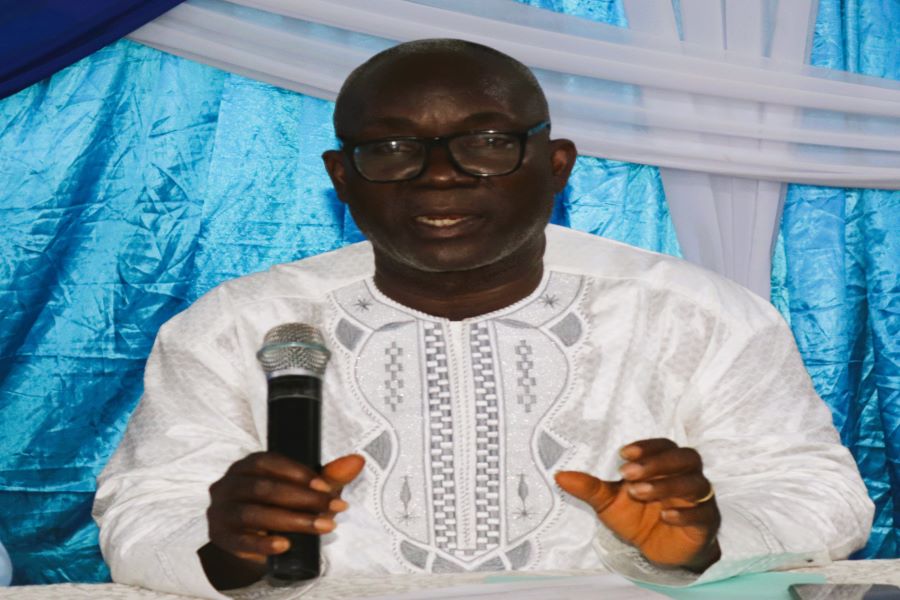
The President of CAOPA, Gaoussou GUEYE, advised women to remain united, transparent and confident, while stressing that States have an obligation to provide women with optimal working conditions. “This is not a privilege, it is a right.
He promised that “CAOPA will continue to advocate with states and partners to help improve the living and working conditions of African small-scale fishing women”.
Present at the opening ceremony, the Advisor to the WAEMU Benin Commission, Mr. Ibrahima Karambé said: “The fisheries sector directly employs 5% of the active population of the sub-region, 77% of the products that come from it are destined for human consumption and its contribution to the GDP oscillates around 5%”.
He added: “In view of these figures, you will agree with me that fishing plays a strategic role in the Union’s economy despite certain dysfunctions, including the low level of processing and value-adding of fishery products in the WAEMU area due to the weaknesses of the processing capacities of the actors.
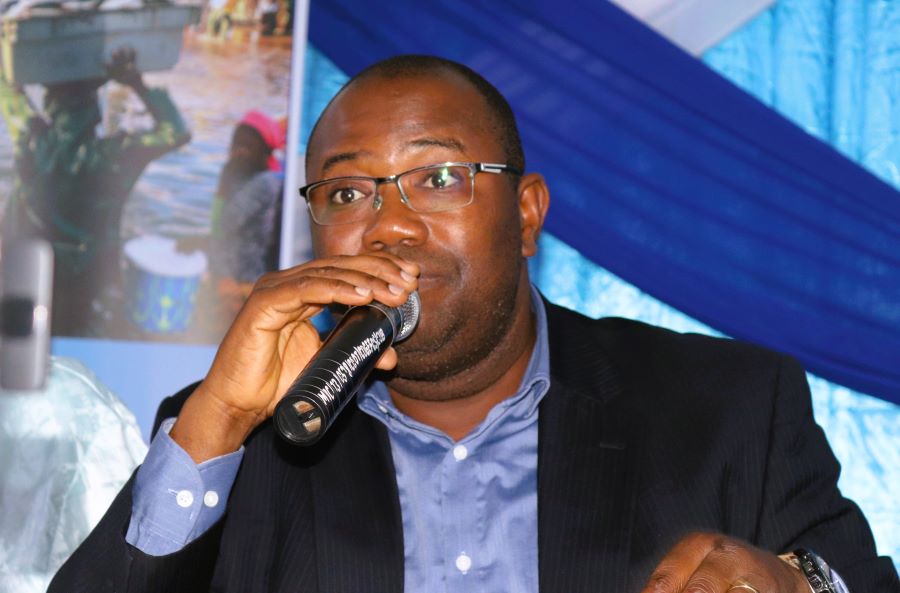
He also mentioned the financial support of 200 million CFA francs granted by the WAEMU Commission to Member States for the structuring of inter-professions in the small-scale fisheries and aquaculture sectors.
This workshop helped to strengthen the skills of women fish processors, scalers and fishmongers and to help them to improve the economic performance of their fishing sector. The participants expressed their satisfaction and their determination to put the knowledge acquired into practice, thus contributing to the development of their community and their sector.
During the practical session, the trainer, Mrs. Seynabou CAMARA NDIAYE, Fisheries and Aquaculture Engineer, Expert in the of fishery products value-adding taught the beneficiaries the techniques of processing and value-adding of fishery products such as the preparation of the raw material, cold conservation, improved small-scale processing techniques, cooked products and semi-canned, sauces to accompany them. At the end of this practice, fish as a raw material was used to make dishes (shrimp fritters, fish croquettes, fish noodles, fish balls, sandwiches, white sauces, ketchup).
The representative of trained women, Mrs. Kogbeto Agnès, a processor and fishmonger in Parakou, expressed her gratitude: “We, women who benefited from this training on the techniques of processing and adding value to fishery products, feel immense joy and deep gratitude. This training has been a real opportunity for us to improve our skills and become leaders in our field of activity.
Rolande Candide, a participant, shared her enthusiasm: “I am so happy to have participated in this training workshop. The new skills I have acquired have opened up new perspectives for me. I now see opportunities to develop and improve my business. I am proud of what I can achieve as a woman entrepreneur in the fisheries sector.”
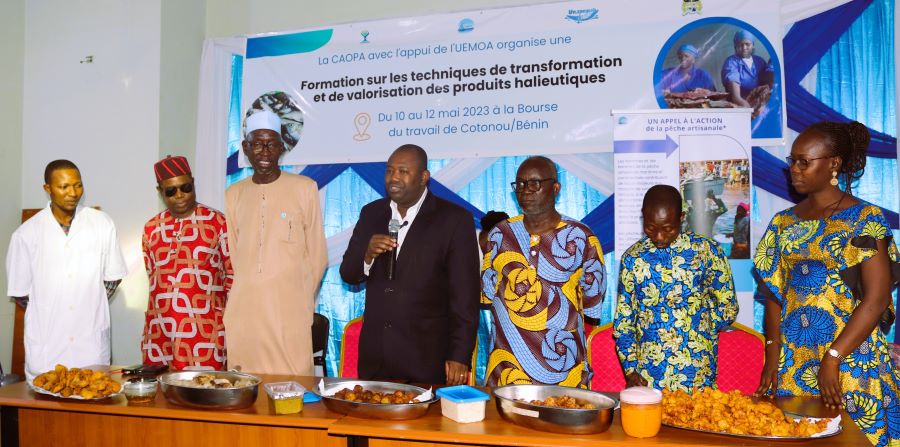
Victor AHOMLANTO, representative of the Director of Fisheries Production, gave a speech at the official opening of the training. He welcomed different delegations and expressed his gratitude to the President of CAOPA, the President of UNAPEMAB and the financial and technical partners.
Victor AHOMLANTO emphasised the importance of this theme in the Government’s Action Programme, in particular in the WAEMU Fisheries and Aquaculture Programme in action, which aims to support fish processing complexes, infrastructures and access to markets for products. He also mentioned the management of post-harvest losses in a world faced with the challenges of climate change and food insecurity linked to the scarcity of fisheries products.
Mamadou Aliou DIALLO


